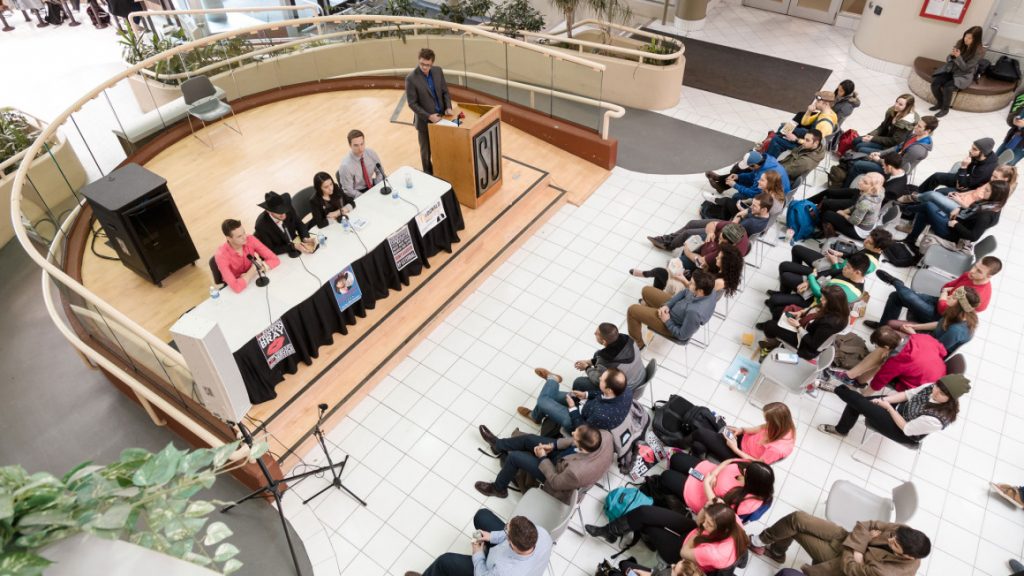
How to win a Students’ Union election
By Jason Herring, January 16 2018 —
Every year, a few dozen students decide to run in the Students’ Union general election. There’s plenty of reasons to run, ranging from the idealistic desire to make the university a better place to the allure of a resumé-padding, decent-paying job while still enjoying the benefits of student life.
What many students don’t realize, however, is just how intensive participating in a student election can be. Candidates typically assemble a large campaign team, restructure their course load and spend countless hours chasing a result that the majority fail to achieve. These misconceptions are all the more pronounced for students who aren’t already involved with the SU and aren’t exposed to the trials of election season.
For some students, the SU election is a yearly annoyance marked by a sea of posters and the occasional candidate who interrupts their lunch to make a pitch. But a lot more goes into running in an election, like crafting a platform, speaking at public forums, managing finances and effectively communicating to a wide swath of the student population.
Beyond a nice paycheque and a notch in their belt, students running for these roles — especially the five executive positions — have the potential to significantly alter the university experience of the students they represent. The SU is an organization with a lot of power, and with the right students at its helm, there’s potential for real change.
We spoke with two former SU executives — 2014–15 vice-president external and 2015–16 president Levi Nilson and 2014–15 vice-president operations and finance Adam Swertz — about their experiences in SU elections and about what prospective candidates should know before running in this year’s election. The SU has an extensive nominations package on their website and will release more information about how to run near the end of January. Nominations must be declared from Feb. 12–14.
 Before campaigning even starts, students interested in running in the SU election must make a number of decisions, such as what position to run for, what points to campaign for and whether to make the commitment to run. Students have to collect signatures for their nomination to be eligible to run, so this is a good time to flesh out what you want to do without committing to a full platform. While pre-campaigning is not allowed, talking with friends about campaign ideas and asking them for support is valuable.
Before campaigning even starts, students interested in running in the SU election must make a number of decisions, such as what position to run for, what points to campaign for and whether to make the commitment to run. Students have to collect signatures for their nomination to be eligible to run, so this is a good time to flesh out what you want to do without committing to a full platform. While pre-campaigning is not allowed, talking with friends about campaign ideas and asking them for support is valuable.
“The most important thing is getting a team of people around you and kind of sussing out which one of your friends and peers would be willing to support you in an election,” Swertz says. “To reach out to the 25,000-plus undergraduates on campus isn’t a one-man job.”
Talking to students should give you a relatively good idea of what kind of things they want to see from their student government, as long as the resulting platform points stay within the realm of possibly. He points at a reduction or removal of parking fees as something unobtainable that students campaign on annually.
“Some people have these over the top ideas that aren’t necessarily feasible,” he says. “Someone that’s done their research knows that removing parking fees isn’t going to happen. Someone that did their research will realize it isn’t possible and scratch it off.”
Some other unrealistic platform points that emerge during most elections include building a mobile app, bringing popular food vendors to campus or altering exam or class scheduling. Doing research and knowing the scope of the position you’re running for is essential in having your best shot at earning the job and succeeding once you’re there.
Swertz also points out that since most students are only on campus for five years or less, looking back at old campaign platforms and reworking points could be an effective strategy.
For Nilson, a good candidate knows how to have a little fun while also considering the responsibilities of the role they’re running for.
“You can’t take yourself too seriously, cause if you do you’re a loser who’s basically doing this for resume-padding,” Nilson says.
Instead, Nilson advices staying away from buzzwords and crafting a platform that taps into what students will be excited to support. At their most basic, these are things that improve the quality of life for students at the University of Calgary.
“Saying you’re going to have a good relationship with administration isn’t something that students are going to be excited for,” he says. “You have to be new and unique and show people that you’re going to use the huge institutional capacity of the SU to make them have a better experience on campus, whether that’s through making it more affordable or making their classroom experience more meaningful.
It’s hard to overemphasize how significant of a commitment running in a student election is, especially for an executive position. According to Swertz and Nilson, it’s an exhausting experience both mentally and physically that can also be an exercise in humility. They say the best way to counter this fatigue is by having a supportive election team.
“It’s two weeks of putting yourself completely out there on campus. Though a lot of us are, not everyone involved in student politics is a complete narcissist so it’s not the easiest thing to do,” Nilson says.
It’s worth noting that though formal slates are no longer allowed in SU elections, many candidates form alliances and friendships during the race. While the support and resources of a candidate competing for a seperate position is valuable, remember that if you win you’ll have to work with all other victors, regardless of whether or not you were rooting for them.

Walking through campus on the first Monday of the campaign period is a ridiculous, novel experience. The highest-traffic walls are covered nearly from the floor to ceiling with campaign posters, their quality ranging from professional commissions to a 15-minute Microsoft Paint job. But how important are posters to a candidate’s election chances?
According to Swertz, posters are most effective for their intrinsic ability to serve as a passive form of campaigning. He says that for a poster to be effective, it has to be well-made and it must make the candidate’s name memorable.
“If you design a poster and you are not someone from a design background, what you think is up to par based on your own skill level might not actually be,” he says.
Swertz values style over substance for posters, saying that unless a campaign point can be summed up in a handful of words, it will distract from the design. Having something that stands out for any reason is key.
When Nilson ran in the SU election, he didn’t put up any posters, saying that he believes most students overestimate their importance.
“In an exec election you’re going to need a couple thousand votes. You’re not going to get that by having a funny poster or having your posters everywhere,” he says.”
While Nilson declined to make posters for his candidacy, he and Swertz both hung banners on campus. Swertz even camped out for two days to secure the banner spot on the way from the University CTrain station. Spots like that and in MacHall or the Science B tunnel are valuable, but certainly aren’t worth taking an unnecessary physical or mental toll on yourself.
A less passive campaigning method is classroom visits, which candidates must obtain written permission from a professor at least 24 hours before the class to perform. In these, election hopefuls speak briefly before a class to a room full of students, typically emphasizing their platform and pushing them to vote. While there’s certainly a lot of value to delivering an effective, concise pitch to hundreds of students at once, Nilson believes the oversaturation of classroom visits often render them ineffective, saying that pitching to niche groups is often a better bet.
“Everyone goes to the 300-people classes and thinks just because they’ve got a big audience means they’ll get the most votes. Overall, people just completely tune out,” he says. “You need to go to the students that nobody cares about.”
The most active — and most intimidating — method of reaching students is cold approaches, where candidates or their friends approach students and directly pitch their campaign. While threatening, staying confident and shaking off rejection is important. As well, a cohesive and memorable theme helps. Swertz, for example, used Jurassic Park as the basis for his campaign.
“He dressed up as a dinosaur and had a friend dressed up as a park ranger chasing him around and it was fucking hilarious,” Nilson recalls. “He had people walking around with a boombox blasting the theme song.”
When paired with an articulate candidate and a solid platform, a theme like this can be instrumental in getting students to pay attention to your campaign.
Taking chances with election materials can pay off too. An infamous example of this was Hayley Wade, a candidate for vice-president student life in 2012. She gained internet notoriety with posters hung above urinals that featured Wade pointing at the viewer with text reading, “Nice dick, bro!” She won handily, making bathrooms a no-campaign zone in the process.
Ultimately, though, Nilson feels that a campaign without substance can’t be buoyed by style or marketing.
“If you’re promising collaboration and effective advocacy and those buzzwords that don’t mean anything, it doesn’t matter how you do it, people aren’t going to give a shit,” he says. “You have to actually put something forward that students like. The unengaged student is unengaged because that’s the type of engagement they’ve been getting.”

All things considered, there aren’t a ton of obligations that candidates have to content with during SU elections. They are, however, expected to attend forums and to complete an interview with the Gauntlet editorial board. Forums are held by organizations like the SU, the Residents’ Students Association and the Engineering Students’ Society and offer all candidates for a position the opportunity to answer questions and pitch their platform.
While not all forums are well-attended, those who make the effort to see candidates speak are typically those who already have an interest in student politics and who are likely to influence other voters. That means that a crowd of a dozen could turn into 50 votes if everyone attending the forum vouches for your candidacy to a handful of their friends.
“If you show up to MacHall and there are only 20 or 10 people there to hear you speak, you still have to give it your all,” Swertz says. “You have to prove to those people that you’re someone of substance that they could vote for and should vote for.”
“Forums are a ton of fun as a candidate and they also make candidates think about different communities on campus,” Nilson adds. “You have to actually think about how you can benefit these people and having a forum to get through, especially if they endorse candidates, is so huge.”
Beyond forums, there’s the Gauntlet election supplement, in which a group of editors interview each executive candidate, write summaries and make endorsements.
“If you know what you’re talking about, it’s fine, but it sometimes gets out of control when it’s obvious people have no clue what they’re talking about,” Nilson says.
During the voting days that end the election period, it’s important to shift emphasis from telling people about yourself to actually getting people to vote. Many, including Nilson, use what they call a ‘war room’ to gather a group of friends and compile a spreadsheet of social media contacts to coordinate sending voting reminders.
Running in an SU election is a massive commitment, but it’s also a lot of fun and can secure you a pretty sweet job for a year. If you’re considering running, think about what you’d like to change and how you’d do that. Then get out there and give it your all.
